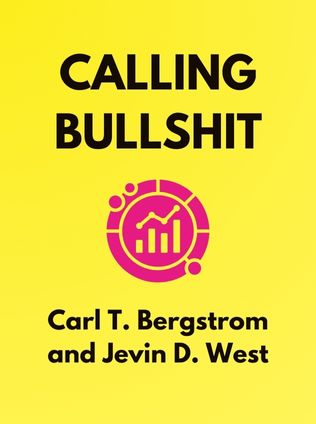
Calling Bullshit
The Art of Skepticism in a Data-Driven World
By Carl T. Bergstrom and Jevin D. West
Published 08/2020
About the Author
Carl T. Bergstrom and Jevin D. West are two scholars whose interdisciplinary expertise and commitment to the truth converge in their groundbreaking work, "Calling Bullshit." Bergstrom, a professor of biology at the University of Washington, has spent much of his career exploring the intersections of evolutionary biology and information science. His work often examines how misinformation and poor reasoning can influence scientific and public discourse. Jevin D. West, also a professor at the University of Washington, co-founded the DataLab, an innovative center focused on the application and impact of data science. West’s research is primarily concerned with the social implications of data and algorithms, making him particularly well-suited to address the modern deluge of misleading information.
Together, Bergstrom and West have created a unique synthesis of their respective fields. Their book, "Calling Bullshit," is not just a product of their academic inquiry but a culmination of a course they developed at the University of Washington. This course, also titled "Calling Bullshit," became a viral sensation and inspired the broader public to critically assess the information they consume. The authors' combined backgrounds in biology and data science provide a comprehensive toolkit for dissecting misinformation and understanding the mechanisms that allow it to spread so rapidly in the digital age.
Main Idea
"Calling Bullshit" addresses the pervasive spread of misinformation in contemporary society. Bergstrom and West define "bullshit" as the use of misleading evidence to sway an audience without regard for the truth. They argue that bullshit is particularly rampant in the digital era, where the internet and media outlets are often more focused on generating clicks and revenue than on delivering accurate information. The book outlines various forms of bullshit, particularly those that arise from misinterpreted data and scientific findings, and provides readers with the tools to recognize and call out bullshit in all its forms.
Introduction to Bullshit
To understand how to combat bullshit, one must first understand what it is. Bergstrom and West describe bullshit as any attempt to persuade using evidence that obscures rather than clarifies the truth. This can involve the use of complex jargon, out-of-context statistics, or even data that has been manipulated to support a particular agenda. The authors emphasize that the defining characteristic of bullshit is a disregard for the truth, whether intentional or due to indifference. This can manifest in political rhetoric, sensationalized news stories, or even everyday conversations.
The concept of bullshit is not new. Philosophers like Plato have long criticized the use of rhetoric to persuade rather than to uncover truth. However, the scale and speed at which bullshit can spread today, thanks to the internet and social media, make it a more urgent issue than ever before. Bergstrom and West argue that recognizing and refuting bullshit is a critical skill in the information age, one that can be developed through careful analysis and a healthy dose of skepticism.
Sign up for FREE and get access to 1,400+ books summaries.
You May Also Like
How To Win Friends and Influence People
The All-Time Classic Manual Of People Skills
By Dale CarnegieQuiet: The Power of Introverts
The Power of Introverts in a World That Can't Stop Talking
By Susan CainFactfulness
Ten Reasons We're Wrong About the World – and Why Things Are Better Than You Think
By Hans Rosling



















